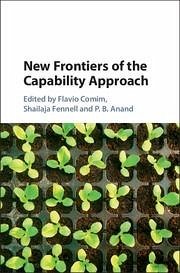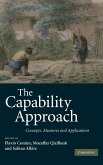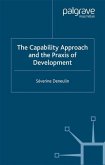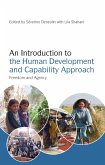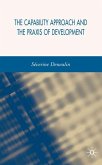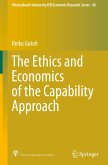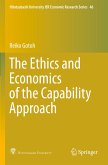New Frontiers of the Capability Approach
Herausgeber: Comim, Flavio; Anand, P B; Fennell, Shailaja
New Frontiers of the Capability Approach
Herausgeber: Comim, Flavio; Anand, P B; Fennell, Shailaja
- Gebundenes Buch
- Merkliste
- Auf die Merkliste
- Bewerten Bewerten
- Teilen
- Produkt teilen
- Produkterinnerung
- Produkterinnerung
Leading scholars from a range of disciplines come together in an inclusive discussion of the latest techniques and issues examined by the capability approach.
Andere Kunden interessierten sich auch für
![The Capability Approach The Capability Approach]() Flavio Comim / Mozaffar Qizilbash / Sabina Alkire (eds.)The Capability Approach97,99 €
Flavio Comim / Mozaffar Qizilbash / Sabina Alkire (eds.)The Capability Approach97,99 €![The Capability Approach and the Praxis of Development The Capability Approach and the Praxis of Development]() S. DeneulinThe Capability Approach and the Praxis of Development75,99 €
S. DeneulinThe Capability Approach and the Praxis of Development75,99 €![An Introduction to the Human Development and Capability Approach An Introduction to the Human Development and Capability Approach]() An Introduction to the Human Development and Capability Approach180,99 €
An Introduction to the Human Development and Capability Approach180,99 €![The Capability Approach and the PRAXIS of Development The Capability Approach and the PRAXIS of Development]() S. DeneulinThe Capability Approach and the PRAXIS of Development110,99 €
S. DeneulinThe Capability Approach and the PRAXIS of Development110,99 €![Amartya Sen's Work and Ideas Amartya Sen's Work and Ideas]() Diana Strassmann / Bina Agarwal (eds.)Amartya Sen's Work and Ideas179,99 €
Diana Strassmann / Bina Agarwal (eds.)Amartya Sen's Work and Ideas179,99 €![The Ethics and Economics of the Capability Approach The Ethics and Economics of the Capability Approach]() Reiko GotohThe Ethics and Economics of the Capability Approach90,99 €
Reiko GotohThe Ethics and Economics of the Capability Approach90,99 €![The Ethics and Economics of the Capability Approach The Ethics and Economics of the Capability Approach]() Reiko GotohThe Ethics and Economics of the Capability Approach90,99 €
Reiko GotohThe Ethics and Economics of the Capability Approach90,99 €-
-
-
Leading scholars from a range of disciplines come together in an inclusive discussion of the latest techniques and issues examined by the capability approach.
Hinweis: Dieser Artikel kann nur an eine deutsche Lieferadresse ausgeliefert werden.
Hinweis: Dieser Artikel kann nur an eine deutsche Lieferadresse ausgeliefert werden.
Produktdetails
- Produktdetails
- Verlag: Cambridge University Press
- Seitenzahl: 670
- Erscheinungstermin: 6. Dezember 2018
- Englisch
- Abmessung: 236mm x 191mm x 30mm
- Gewicht: 1134g
- ISBN-13: 9781108427807
- ISBN-10: 1108427804
- Artikelnr.: 51142716
- Herstellerkennzeichnung
- Libri GmbH
- Europaallee 1
- 36244 Bad Hersfeld
- gpsr@libri.de
- Verlag: Cambridge University Press
- Seitenzahl: 670
- Erscheinungstermin: 6. Dezember 2018
- Englisch
- Abmessung: 236mm x 191mm x 30mm
- Gewicht: 1134g
- ISBN-13: 9781108427807
- ISBN-10: 1108427804
- Artikelnr.: 51142716
- Herstellerkennzeichnung
- Libri GmbH
- Europaallee 1
- 36244 Bad Hersfeld
- gpsr@libri.de
Introduction Flavio Comim, Shailaja Fennell and P. B. Anand; 1. Key-note
chapter: on Sen on the capability of capabilities: the story of a
not-for-profit enterprise J. G. Meeks; Part I. The Need for New
Foundations: 2. Capabilities and the common good Jonathan Warner; 3.
Measuring the meta-capability of agency: theoretical basis for creating a
responsibility indicator Mathias Nebel and Maria-Teresa Herrera-Nebel; 4.
Equal liberty, reflective equilibrium and education: defending Rawls from
Sen's criticisms Caroline Souza and Gabriel Goldmeier; 5. On epistemic
diversity, ontologies and assumptions in capability approaches Josh Platzky
Miller; 6. Collective agency capability: how capabilities can emerge in a
social moment Razia Shariff; Part II. The Operationalisation Frontier: 7.
Sen's capability approach, social choice theory and the use of rankings
Flavio Comim; 8. Selecting capabilities for development: an evaluation of
proposed methods Morten Byskov; 9. From resources to functioning:
rethinking and measuring conversion rates Enrica Chiappero, Paola Salardi
and Francesco Scervini; 10. Demystifying the use of simultaneous equation
models for operationalising the capability approach Jaya Krishnakumar and
Ricardo Nogales; Part III. The Application Frontier: 11. Human development
in India - comparing Sen and his competitors Des Gasper; 12. Sustainable
human development measurement issues: a new proposal Mario Biggeri and
Vicenzo Mauro; 13. Inequality and capabilities: a multidimensional
empirical exploration in Chile Macarena Orchard and Martina Yopo; 14.
Living wages in international supply chains and the capability approach:
towards a conceptual framework Stephanie Schrage and Kristin Huber; 15. For
a happy human development Tadashi Hirai; 16. Capability of capabilities and
aspirations of the middle classes in India Meera Tiwari; 17. The value
individual and community social resources Paul Anand; Part IV. The Housing
and Urban Frontier: 18. Tracking the transition from 'basic needs' to
'capabilities' for human-centred development: the role of housing in urban
inclusion Shailaja Fennell, Jaime Royo-Olid and Matthew Barac; 19. Building
regulations through the capability lens: for safer and inclusive built
environment? Prachi Acharya; 20. Cities and the capability approach P. B.
Anand; Part V. The Education Frontier: 21. Formal education, well-being and
aspirations; a capability based analysis on high school pupils from France
Robin Vos and Jérôme Ballet; 22. Other people's adaptations: teaching
children with special educational needs to adapt and to aspire Cristina
Devecchi and Michael Watts; 23. Expanding children's capabilities at the
writers' workshop Helena Kiff; Education and 'the capability approach
Caroline Hart.
chapter: on Sen on the capability of capabilities: the story of a
not-for-profit enterprise J. G. Meeks; Part I. The Need for New
Foundations: 2. Capabilities and the common good Jonathan Warner; 3.
Measuring the meta-capability of agency: theoretical basis for creating a
responsibility indicator Mathias Nebel and Maria-Teresa Herrera-Nebel; 4.
Equal liberty, reflective equilibrium and education: defending Rawls from
Sen's criticisms Caroline Souza and Gabriel Goldmeier; 5. On epistemic
diversity, ontologies and assumptions in capability approaches Josh Platzky
Miller; 6. Collective agency capability: how capabilities can emerge in a
social moment Razia Shariff; Part II. The Operationalisation Frontier: 7.
Sen's capability approach, social choice theory and the use of rankings
Flavio Comim; 8. Selecting capabilities for development: an evaluation of
proposed methods Morten Byskov; 9. From resources to functioning:
rethinking and measuring conversion rates Enrica Chiappero, Paola Salardi
and Francesco Scervini; 10. Demystifying the use of simultaneous equation
models for operationalising the capability approach Jaya Krishnakumar and
Ricardo Nogales; Part III. The Application Frontier: 11. Human development
in India - comparing Sen and his competitors Des Gasper; 12. Sustainable
human development measurement issues: a new proposal Mario Biggeri and
Vicenzo Mauro; 13. Inequality and capabilities: a multidimensional
empirical exploration in Chile Macarena Orchard and Martina Yopo; 14.
Living wages in international supply chains and the capability approach:
towards a conceptual framework Stephanie Schrage and Kristin Huber; 15. For
a happy human development Tadashi Hirai; 16. Capability of capabilities and
aspirations of the middle classes in India Meera Tiwari; 17. The value
individual and community social resources Paul Anand; Part IV. The Housing
and Urban Frontier: 18. Tracking the transition from 'basic needs' to
'capabilities' for human-centred development: the role of housing in urban
inclusion Shailaja Fennell, Jaime Royo-Olid and Matthew Barac; 19. Building
regulations through the capability lens: for safer and inclusive built
environment? Prachi Acharya; 20. Cities and the capability approach P. B.
Anand; Part V. The Education Frontier: 21. Formal education, well-being and
aspirations; a capability based analysis on high school pupils from France
Robin Vos and Jérôme Ballet; 22. Other people's adaptations: teaching
children with special educational needs to adapt and to aspire Cristina
Devecchi and Michael Watts; 23. Expanding children's capabilities at the
writers' workshop Helena Kiff; Education and 'the capability approach
Caroline Hart.
Introduction Flavio Comim, Shailaja Fennell and P. B. Anand; 1. Key-note
chapter: on Sen on the capability of capabilities: the story of a
not-for-profit enterprise J. G. Meeks; Part I. The Need for New
Foundations: 2. Capabilities and the common good Jonathan Warner; 3.
Measuring the meta-capability of agency: theoretical basis for creating a
responsibility indicator Mathias Nebel and Maria-Teresa Herrera-Nebel; 4.
Equal liberty, reflective equilibrium and education: defending Rawls from
Sen's criticisms Caroline Souza and Gabriel Goldmeier; 5. On epistemic
diversity, ontologies and assumptions in capability approaches Josh Platzky
Miller; 6. Collective agency capability: how capabilities can emerge in a
social moment Razia Shariff; Part II. The Operationalisation Frontier: 7.
Sen's capability approach, social choice theory and the use of rankings
Flavio Comim; 8. Selecting capabilities for development: an evaluation of
proposed methods Morten Byskov; 9. From resources to functioning:
rethinking and measuring conversion rates Enrica Chiappero, Paola Salardi
and Francesco Scervini; 10. Demystifying the use of simultaneous equation
models for operationalising the capability approach Jaya Krishnakumar and
Ricardo Nogales; Part III. The Application Frontier: 11. Human development
in India - comparing Sen and his competitors Des Gasper; 12. Sustainable
human development measurement issues: a new proposal Mario Biggeri and
Vicenzo Mauro; 13. Inequality and capabilities: a multidimensional
empirical exploration in Chile Macarena Orchard and Martina Yopo; 14.
Living wages in international supply chains and the capability approach:
towards a conceptual framework Stephanie Schrage and Kristin Huber; 15. For
a happy human development Tadashi Hirai; 16. Capability of capabilities and
aspirations of the middle classes in India Meera Tiwari; 17. The value
individual and community social resources Paul Anand; Part IV. The Housing
and Urban Frontier: 18. Tracking the transition from 'basic needs' to
'capabilities' for human-centred development: the role of housing in urban
inclusion Shailaja Fennell, Jaime Royo-Olid and Matthew Barac; 19. Building
regulations through the capability lens: for safer and inclusive built
environment? Prachi Acharya; 20. Cities and the capability approach P. B.
Anand; Part V. The Education Frontier: 21. Formal education, well-being and
aspirations; a capability based analysis on high school pupils from France
Robin Vos and Jérôme Ballet; 22. Other people's adaptations: teaching
children with special educational needs to adapt and to aspire Cristina
Devecchi and Michael Watts; 23. Expanding children's capabilities at the
writers' workshop Helena Kiff; Education and 'the capability approach
Caroline Hart.
chapter: on Sen on the capability of capabilities: the story of a
not-for-profit enterprise J. G. Meeks; Part I. The Need for New
Foundations: 2. Capabilities and the common good Jonathan Warner; 3.
Measuring the meta-capability of agency: theoretical basis for creating a
responsibility indicator Mathias Nebel and Maria-Teresa Herrera-Nebel; 4.
Equal liberty, reflective equilibrium and education: defending Rawls from
Sen's criticisms Caroline Souza and Gabriel Goldmeier; 5. On epistemic
diversity, ontologies and assumptions in capability approaches Josh Platzky
Miller; 6. Collective agency capability: how capabilities can emerge in a
social moment Razia Shariff; Part II. The Operationalisation Frontier: 7.
Sen's capability approach, social choice theory and the use of rankings
Flavio Comim; 8. Selecting capabilities for development: an evaluation of
proposed methods Morten Byskov; 9. From resources to functioning:
rethinking and measuring conversion rates Enrica Chiappero, Paola Salardi
and Francesco Scervini; 10. Demystifying the use of simultaneous equation
models for operationalising the capability approach Jaya Krishnakumar and
Ricardo Nogales; Part III. The Application Frontier: 11. Human development
in India - comparing Sen and his competitors Des Gasper; 12. Sustainable
human development measurement issues: a new proposal Mario Biggeri and
Vicenzo Mauro; 13. Inequality and capabilities: a multidimensional
empirical exploration in Chile Macarena Orchard and Martina Yopo; 14.
Living wages in international supply chains and the capability approach:
towards a conceptual framework Stephanie Schrage and Kristin Huber; 15. For
a happy human development Tadashi Hirai; 16. Capability of capabilities and
aspirations of the middle classes in India Meera Tiwari; 17. The value
individual and community social resources Paul Anand; Part IV. The Housing
and Urban Frontier: 18. Tracking the transition from 'basic needs' to
'capabilities' for human-centred development: the role of housing in urban
inclusion Shailaja Fennell, Jaime Royo-Olid and Matthew Barac; 19. Building
regulations through the capability lens: for safer and inclusive built
environment? Prachi Acharya; 20. Cities and the capability approach P. B.
Anand; Part V. The Education Frontier: 21. Formal education, well-being and
aspirations; a capability based analysis on high school pupils from France
Robin Vos and Jérôme Ballet; 22. Other people's adaptations: teaching
children with special educational needs to adapt and to aspire Cristina
Devecchi and Michael Watts; 23. Expanding children's capabilities at the
writers' workshop Helena Kiff; Education and 'the capability approach
Caroline Hart.

